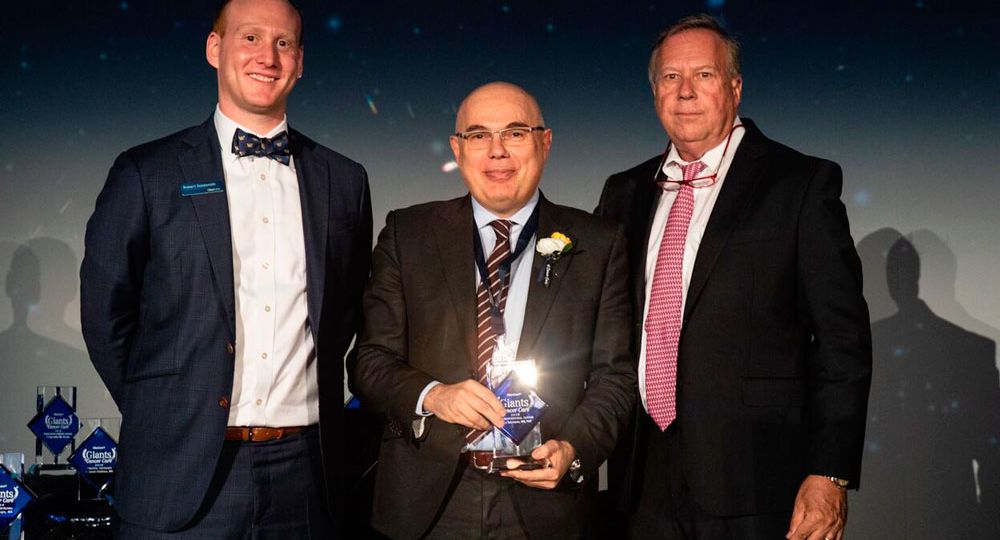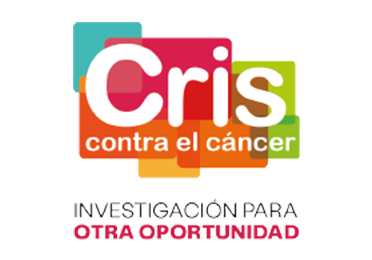
Some 40,000 oncology professionals from across the globe recently gathered in Chicago for the 2018 Annual Meeting of the American Society of Clinical Oncology (ASCO), 01 – 05 June, to learn about the latest in clinical cancer research — from new treatment options and advances in precision medicine to insight for improving access to care.
Themed Delivering discoveries: expanding the reach of precision medicine, this most prestigious meeting in clinical oncology the world over counted over 5,000 abstracts, several of which were authored by some of VHIO’s leading clinical investigators and selected by ASCO to first outing in Chicago.
Gigantic achievements in collaboration
Prior to providing a mere snapshot of VHIO’s many contributions during the meeting, recognition of VHIO-led research commenced upon the eve of ASCO. As previously announced in VHIO News last month, one of this year’s 21 recipients of the OncLive Giants of Cancer Care Awards, now in the sixth annual edition, was our Director, Josep Tabernero. Awarded under the category of gastrointestinal cancer, this important accolade salutes Josep’s determined efforts aimed at advancing cancer research, precision treatment and care in oncology.

Upon receiving the Award Josep Tabernero said, “This prestigious award recognizes the tireless efforts of the many gifted researchers and devoted oncology professionals that I have the good fortune to work with day in, day out in my dual capacity as Director of the Vall d´Hebron Institute of Oncology as well as Head of the Medical Oncology Department at the Vall d’Hebron Hospital in Barcelona”.
Expressing his gratitude to the prize founders and organizers Michael J. Hennessy Jr., President of MJH Associates Inc., OncLive, as well as the seven-member Advisory Board chaired by Patrick I. Borgen, he concluded, “Without such gifted teams, the support received from colleagues and peers across countries, and the belief and generosity of those who matter most – our cherished patients – we could not possibly hope to pursue our collective ambitions aimed at solving cancer sooner”.
A hand-pick of just some of the many VHIO session highlights and studies showcased during ASCO (organized by day of the meeting):
Saturday 02 June, 2018
Session Type: Poster Discussion Session
Session Title: Genitourinary (Non-prostate cancer)
BMS-986205, an indoleamine 2,3-dioxygenase 1 inhibitor (IDO1i), in combination with nivolumab (NIVO): Updated safety across all tumor cohorts and efficacy in pts with advanced bladder cancer (advBC)
VHIO’s Director, Josep Tabernero, presented evidence on the safety and efficacy of combined therapy with the experimental indoleamine 2,3-dioxygenase 1 (IDO1) inhibitor, BMS-986205, which shows potential antitumor and immunomodulatory activity, plus nivolumab (NIVO) immunotherapy – a checkpoint inhibitor targeting the PD-1 molecule, in patients with advanced bladder cancer.
“Nivolumab has previously demonstrated durable responses and manageable safety in patients with advanced bladder cancer. To prolong survival in more patients we need to potentiate our therapeutic approaches in combination in order to more effectively counteract tumor evasion mechanisms,” observed Josep, first author of the study.
Given that IDO1 allows tumor escape through the production of kynurenine which stimulates the development of regulatory T cells and suppresses effector T-cell proliferation, and therapy with nivolumab can upregulate IDO1 activity, this has served as the rationale for combining NIVO with BMS-986205 for patients with advanced cancers and heavily treated with other therapies.
“Our results show that this pairing was well tolerated with a similar safety profile to treatment with nivolumab monotherapy. The promise of inhibiting IDO1 coupled with immunotherapy in boosting the anti-tumor response coupled with our results showing positive activity in patients with advanced bladder cancer warrants further investigation of this combination,” he concluded.
Session Type: Poster Discussion Session
Session Title: Breast Cancer-Metastatic
A phase I expansion cohorts study of SYD985 in heavily pretreated patients with HER2-positive or HER2-low metastatic breast cancer
A phase I expansion cohorts study led by VHIO’s Cristina Saura, Principal Investigator of our Breast Cancer & Melanoma Group, assessed SYD985, a novel duocarmycin-based HER2-targeting antibody-drug conjugate (ADC) for the treatment of metastatic breast cancer.
Presented during a Poster Discussion Session, results evidenced that SYD985 not only shows promising activity in patients with metastatic HER2-positive breast cancer in particular, but also in those with metastatic HER2-negative breast cancer.
Ninety-nine breast cancer patients were enrolled in the study and fifty of them had HER2-positive breast cancer. The majority of the fifty had received three or more prior HER2-targeting therapies in the locally advanced or metastatic settings, including (ado-)trastuzumab emtansine in 80% of patients. Preliminary results showed that SYD985 had an overall response rate of 33% and a mean progression-free survival of 9.4 months. At the time of data cut-off, eight patients (16%) had received SYD985 for more than one year and five (10%) were still receiving treatment.
“Efficacy has also been demonstrated in heavily pre-treated patients with metastatic breast cancer classified as HER2-low, including hormone-receptor positive and triple-negative breast cancer. The overall response rates in these cases were 27 and 40%, respectively,” explained Cristina Saura. The safety profile was manageable and the most common adverse drug reactions were fatigue, ocular toxicity and, among the most severe, neutropenia or a weakened immune system in 6% of cases treated.
“Ultimately,” she concluded “SYD985 shows therapeutic promise in heavily pre-treated patients with breast cancer, both in HER2-positive and HER2-low cancers with or without hormone-receptor expression. A phase III registration study (TULIP) is currently underway in HER2-positive breast cancer patients, and patient enrolment is now open.”
Sunday 03 June, 2018
Session Type:Poster Discussion Session
Session Title: Lung Cancer-Non-Small Cell Metastatic
Tepotinib in patients with advanced non-small cell lung cancer (NSCLC) harboring MET exon 14-skipping mutations: Phase II trial
First author Enriqueta Felip, Principal Investigator of VHIO’s Thoracic Tumors & Head and Neck Cancer Group, revealed results from a Phase II multicenter trial during a Poster Discussion Session on Non-Small Cell Metastatic Lung Cancer. Findings demonstrated the efficacy and safety of the selective and potent c-MET inhibitor tepotinib in patients with advanced non-small cell lung cancer (NSCLC) haboring MET mutations.
More specifically, tepotinib (also known as MSC2156119J or EMD1214063) is an inhibitor of the c-Met receptor tyrosine kinase and has been shown to halt the growth and regression of tumors with c-Met mutations, c-Met overexpression, or hepatocyte growth factor secretion in preclinical models.Importantly, between 3-4% of NSCLCs bear this type of mutation which makes them potentially sensitive to treatment with this therapy.
“Selective c-Met inhibitors promise efficacy and a manageable safety profile in patients with NSCLC. Not only have we now validated the same promising activity and safety of tepotinib observed in prior studies, we have also done so in this group of patients with this specific molecular alteration,” observed Enriqueta Felip.
These results represent an important next step towards better guiding a more precise therapeutic strategy matched to the molecular specificities of this patient population.
Monday 04 June, 2018
Session Type: Clinical Science Symposium
Session Title: Innovative Immune and Genomic Biomarkers for Solid Tumors
WINTHER: An international WIN Consortium precision medicine trial using genomic and transcriptomic analysis in patients with advanced malignancies
Promoted within the scope of the WIN – Worldwide Innovative Networking in personalized cancer medicine, of which VHIO is one of the thirty five institutional members, WINTHER (WINTherapeutics) launched back in 2012 and represents a unique academic and international clinical trial aimed at better predicting drug sensitivity and optimizing individualized therapeutic decisions with improved clinical outcomes for patients.
The much awaited results from this study were presented as an Oral Presentation during a Clinical Science Symposium by first author Jordi Rodón, Investigator at the MD Anderson Cancer Center (Texas – USA), and Associate Investigator and Senior Consultant of VHIO’s Research Unit for Molecular Therapy of Cancer (UITM) – “la Caixa”, led by Elena Garralda.
Up until now, precision medicine has largely focused on matching therapies on the basis of genetic alterations after gene mutations are identified. Not all patients however bear tractable genomic alterations and in these cases, the way in which genes are expressed can be decisive in more precisely selecting anti-cancer treatments. The ambitious WINTHER trial, the first of its kind, was designed to navigate patients with advanced disease to therapy based on either next generation sequencing (NGS) or transcriptomic analysis that compared tumor to normal tissue through a pioneering dual biopsy approach.
“We performed genome sequencing on all samples using a panel detecting 300-400 genes to identify the genetic alterations present and carried out transcriptomic analysis to determine gene expression. Out of the 303 consented patients, 107 received therapy consistent with the recommendations of the study’s Clinical Management Committee. 69 patients were included in the DNA-guided Arm A of the trial and 38 patients in the RNA-guided Arm B,” said Jordi Rodón, who formerly directed VHIO’s phase I Unit throughout the course of the WINTHER study until data closure.
“Both genomic and transcriptomic analyses helped to more precisely guide therapy selection. It is thanks to this pioneering trial that we have shown that patients who received personalized treatments based on their genetic alterations independently associated with longer progression-free survival and overall survival,” he concluded.
Session Type: Clinical Science Symposium
Session Title: Breast Cancer and Immunotherapy: can we crack the code?
The integrated genomic and immune landscapes of lethal metastatic breast cancer (MBC)

In a second Oral Presentation during Monday’s Clinical Science Symposia, first author Leticia de Mattos-Arruda, Junior Principal Investigator of VHIO’s Applied Genetics of Metastatic Cancer Group, delivered results showing that the integrated analysis of cancer genomics and the tumor immune microenvironment may advance essential insights towards better predicting metastatic breast cancer spread and potentiate personalized anti-cancer therapies.
Led by VHIO researchers and scientists from the Cancer Research Cambridge Institute (UK), mass analyses were preformed to establish the relationship between tumor genomics and the immune system response. In collaboration with colleagues at the Vall d´Hebron University Hospital and the Weizmann Institute of Science (Rehovot – Israel), research focused on the genomic landscapes of metastases of the ten deceased patients studied.
Findings revealed that almost all genomic abnormalities were shared between either all, or a significant subset, of each individual patient’s metastases. The results also indicate that these genomic landscapes are relatively stable.
To better understand the dissemination patterns of disease, the team built phylogenetic trees of the total of 185 metastases identified in these patients. “We observed that in most patients metastases were organized into a few phylogenetic subgroups, each with a specific genetic origin and, in some cases, they indicated the pathway of mechanisms of tumor resistance. These findings have potentially important implications for clinically combating resistance to therapy,” explained Leticia de Mattos-Arruda.
This pioneering study also sought to analyse the mutational signatures of each metastasis. The researchers discovered that those found in the primary breast tumors are also subsequently present in metastases. The metastases in turn bare new signatures.
“This discovery is particularly novel and we believe that this insight can be applied to mapping the origin and evolution of cancer as well as developing biomarkers to more precisely track disease,” commented Leticia.
Another important aspect of their research was to study the tumor immune microenvironment from several angles. In so doing they established that microenvironments are not uniform in individual metastases within the same patient, but may be more homogeneous within a phylogenetic subgroup, or vary between different metastases belonging to a single organ.
By computationally predicting the presence of neoantigens based on the mutations detected in the metastases of each patient, subsequently identified in all, if not a significant subset, this finding promises to advance novel immune-based therapies, such as vaccines, and render existing treatments more precise.
To this end, the authors also deduced how the immune system recognizes these neoantigens as foreign bodies.“We have made phylogenetic trees from metastases and from T-cell receptors, and have seen that they look very similar. This observation is no coincidence since they are certainly correlated, which opens up new therapeutic avenues in boosting an effective anti-tumor immune response in the metastases of a given patient,” she concluded.
Session Type:Poster Discussion Session
Session Title: Developmental Therapeutics – Clinical Pharmacology and Experimental Therapeutics
First-in-class phase I study evaluating MP0250, a VEGF and HGF neutralizing DARPIN molecule, in patients with advanced solid tumors
Analia Azaro, Phase I Investigator of VHIO’s Early Clinical Drug Development Group, Associate Investigator of our Research Unit for Molecular Therapy of Cancer (UITM) – “la Caixa”, and first author of this study reported results on the efficacy of the designed ankyrin repeat proteins (DARPin)-based agent MP0250, binder and inhibitor of both the hepatocyte growth factor (HGF)and vascular endothelial growth factor (VEGF) pathways that mediate the growth of solid tumors, in patients with advanced disease across several tumor types were reported.
Designed to establish the safety, tolerability, recommended biological and maximum tolerated doses, as well as characterize the immunogenicity of this novel agent, findings evidenced single agent antitumor activity and two out of the forty five patients enrolled in the trial achieved a partial response.
Side effects observed were similar to those of other antiangiogenics and the drug’s exposureprofile was that expected for this class of compounds. Further to these promising results, MP0250 is being further developed in a phase II clinical trial for non-small cell lung cancer and multiple myeloma.
Session Type:Poster Session
Session Title: Developmental Therapeutics – Immunotherapy
Incidence and clinical implications of a new definition of hyperprogression (HPD) with immune checkpoint inhibitors (ICIs) in patients treated in phase 1 (Ph1) trials
Hyperprogession disease (HPD) with immune checkpoint inhibitors has recently been described as progression disease (PD) by RECIST with a ≥ two-fold increase in tumor growth rate experimental versus reference. The implementation of this assessment in clinical practice is however challenging since a previous CT scan is required to establish the rate of growth prior to the beginning of treatment.
Led by Ignacio Matos, Phase I Investigator of VHIO’s Early Clinical Drug Development Group and Associate Investigator of our Research Unit for Molecular Therapy of Cancer (UITM) – “la Caixa”, a multidisciplinary and multi-center study, incorporating several VHIO groups, researchers sought to establish a new definition that can be easily applied to the clinic.
By analyzing more than 200 patients treated with immune checkpoint inhibitors (ICIs) in phase I trials conducted at VHIO’s UITM, the results, which were presented as a poster during ASCO, successfully established an intuitive definition. This represents an important forward step in better guiding treatment decisions for these patients.
“We have established an intuitive and easy-to-use definition that can better determine which patients do not show any benefit from treatment with immunotherapy. Importantly, it correlates with poor overall survival and represents a clear contra-indication for treatment beyond progression or a switch to other immune checkpoint inhibitors. Further studies will be required to validate our results,” said Ignacio Matos.
Session Type:Poster Session
Session Title: Melanoma/Skin Cancers
Ipilimumab and radiation in patients with unresectable melanoma brain metastases: A multicenter, open label, phase-2, Spanish Melanoma Group (GEM) study (NCT-2013-001132-22)
First authored by Jose A. Lopez-Martin from the Hospital 12 de Octubre in Madrid, a phase II multicenter trial that counted on the collaboration of Eva Muñoz, Medical Oncologist and Clinical Investigator of VHIO’s Breast Cancer & Melanoma Group, and several other groups belonging to the Spanish Melanoma Group (GEM), assessed the combined use of ipilimumab, a monoclonal antibody, and whole-brain radiotherapy for the treatment of brain metastases in patients with unresectable melanoma.
“We have evidenced that this approach is feasible and that there were no unexpected safety issues. The mean survival of patients who received this combined treatment after one year of therapy is higher than with other prior treatments,” explains Eva Muñoz-Couselo.
This approach may be indicated for those melanoma patients with brain metastases who are not candidates for surgery or radiosurgery and who, up until now, did not have any treatment alternatives.
Tuesday 05 June, 2018
Education Session: Molecular Subtypes and the Evolution of Treatment Decisions in Metastatic Colorectal Cancer
Session Title: The Landscape of Basket Trials in Advanced Colorectal Cancer
Cancers are increasingly defined not by the origin of the tumor, but instead by their genomic and molecular makeup. Better and more precisely subtyping disease is crucial in order to more accurately guide treatment decisions and strategies based on the specificities of each individual patient’s cancer.
The inclusion criterion of so-called ‘basket studies’ is the presence of a genetic alteration that can be matched to a given therapy, irrespective of tumor type. VHIO has pioneered this novel study design which enables an improved molecular definition of disease. Champion of baskets, VHIO’s Director, Josep Tabernero, delivered at talk on how these studies have played a critical role in defining new molecular subtypes in advanced colorectal cancer as part of an ASCO Meeting Education Session.
“Colorectal cancer has a clinically relevant molecular heterogeneity. The genomic events acquired during the development of a tumor define how it will behave upon progression of disease. Hence, a more precise sub-classification of these cancers is paramount in tailoring treatments to individual patients,” explained Josep Tabernero.
“As an example, KRAS and NRAS mutations define populations which are resistant to monoclonal antibodies, BRAFV600E mutations do not respond well to standard therapies, while HER2 amplification confers unique sensitivity to dual HER2 blockade,” he continued.
While multiple genetic mutations have been identified,the molecular heterogeneity of colorectal cancer is hugely complex. Advancing insights into tumour profiles through individual alterations and genetic signatures are ringing in increasingly potent and more effective therapies. Addtionally, positive results are being reported in phase II clinical trials in which BRAFV600E mutations and HER2 gene amplification are acting as predictive biomarkers for the performance of combined targeted therapies.
One of the major challenges faced by investigators in more precisely defining disease is that the molecular heterogeneity of cancer is dynamic and evolves in and over time. Thanks to the clinical development of the liquid biopsy however, researchers can now more effectively track and ‘police’ the course of cancer by analyzing circulating tumor DNA (ctDNA).
“The analysis of ctDNA enables us to detect emerging genomic alterations in a large number of patients who progress with monoclonal antibodies or chemotherapy. These critical insights help guide drug development strategies and ultimately provide new hope for our patients,” concluded Josep.
###










